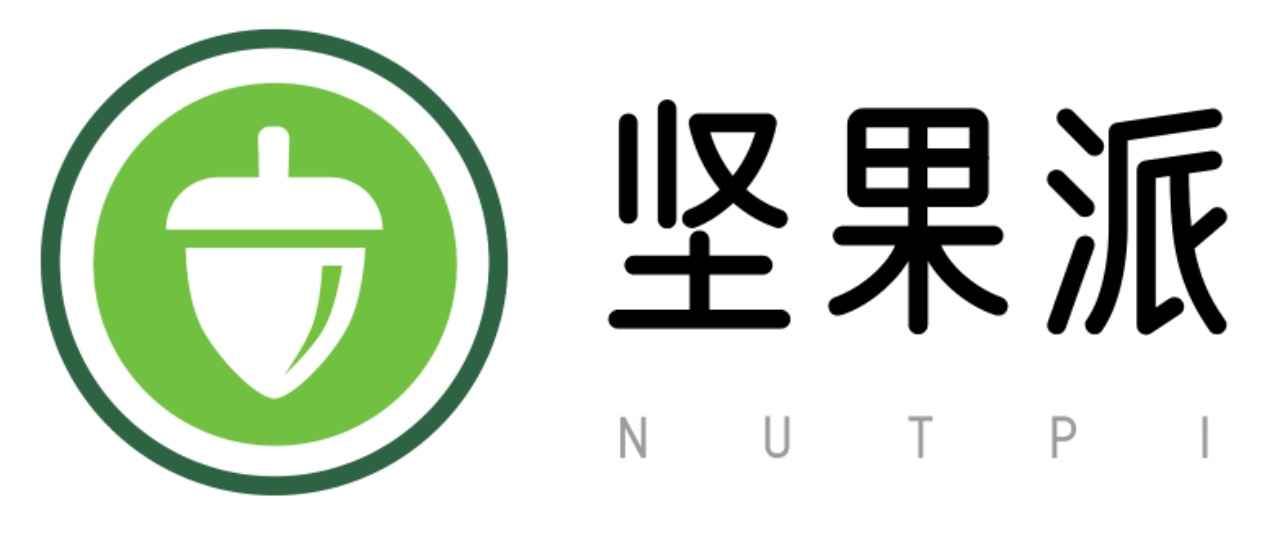184.[HarmonyOS NEXT 实战案例十:Grid] 仪表板网格布局基础篇
[HarmonyOS NEXT 实战案例十:Grid] 仪表板网格布局基础篇
项目已开源,开源地址: https://gitcode.com/nutpi/HarmonyosNextCaseStudyTutorial , 欢迎fork & star
效果演示
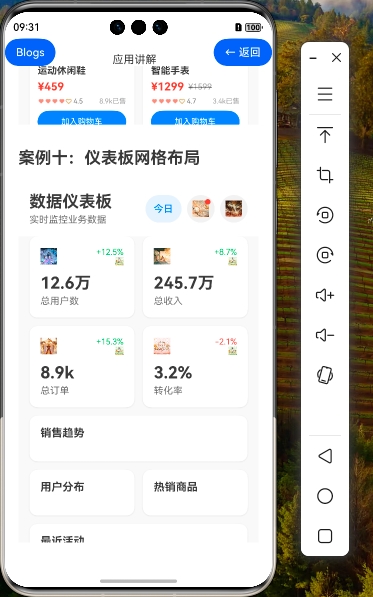
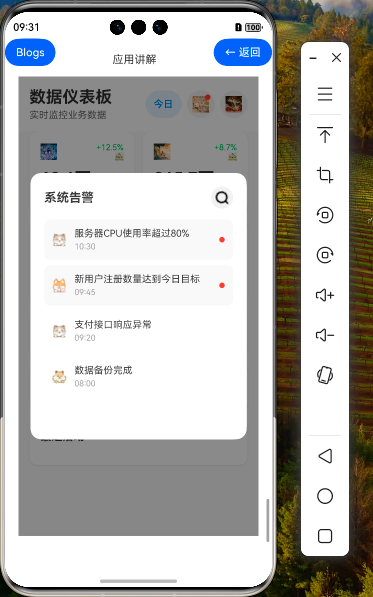
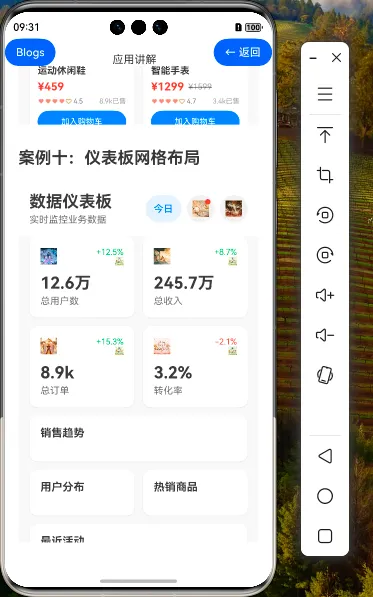
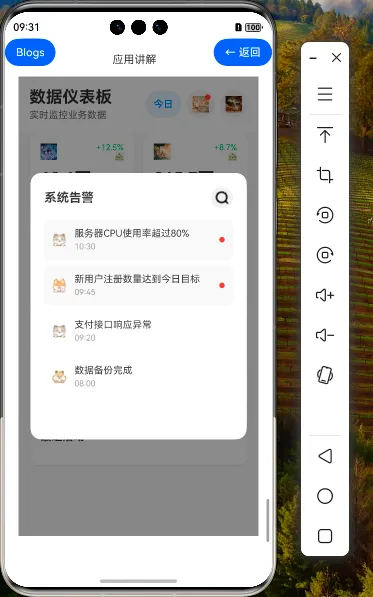
1. 引言
在企业级应用开发中,仪表板(Dashboard)是展示关键业务数据和指标的重要界面,它能够帮助用户快速了解业务状况并做出决策。HarmonyOS NEXT 提供的 Grid 组件具有强大的布局能力,非常适合构建复杂的仪表板界面。本教程将详细讲解如何使用 Grid 组件实现一个功能完善、布局合理的企业级仪表板界面。
2. 仪表板概述
2.1 仪表板的特点
企业级仪表板通常具有以下特点:
- 数据可视化:通过图表、数字卡片等方式直观展示数据
- 信息层次分明:将信息按重要性和关联性进行分组
- 交互性强:支持筛选、刷新、查看详情等操作
- 响应式布局:适应不同屏幕尺寸和方向
- 实时更新:能够定期或实时更新数据
2.2 实现功能
本教程将实现的仪表板功能包括:
- 数据概览:展示关键业务指标(用户数、收入、订单数、转化率)
- 数据图表:销售趋势图、用户分布图
- 数据列表:热销商品排行、最近活动记录
- 告警系统:系统告警通知和查看
- 交互功能:时间范围选择、数据刷新、告警查看
3. 数据模型设计
3.1 数据结构定义
仪表板的数据模型设计是实现的基础。我们定义了以下数据结构:
// 仪表板数据结构
export interface DashboardData {
overview: Overview; // 概览数据
charts: Charts; // 图表数据
alerts: Alert[]; // 告警数据
}
// 概览数据
export interface Overview {
totalUsers: number; // 总用户数
totalRevenue: number; // 总收入
totalOrders: number; // 总订单数
conversionRate: number; // 转化率
userGrowth: number; // 用户增长率
revenueGrowth: number; // 收入增长率
orderGrowth: number; // 订单增长率
conversionGrowth: number; // 转化率增长
}
// 图表数据
export interface Charts {
salesTrend: SalesTrend[]; // 销售趋势
userDistribution: UserDistribution[]; // 用户分布
topProducts: TopProduct[]; // 热销商品
recentActivities: RecentActivity[]; // 最近活动
}
// 销售趋势数据
export interface SalesTrend {
month: string; // 月份
value: number; // 销售额
}
// 用户分布数据
export interface UserDistribution {
category: string; // 用户类别
value: number; // 占比值
color: string; // 显示颜色
}
// 热销商品数据
export interface TopProduct {
name: string; // 商品名称
sales: number; // 销量
revenue: number; // 收入
}
// 最近活动数据
export interface RecentActivity {
time: string; // 时间
user: string; // 用户
action: string; // 行为
type: 'purchase' | 'register' | 'cart' | 'view' | 'payment'; // 类型
}
// 告警数据
export interface Alert {
id: number; // ID
type: 'warning' | 'info' | 'error' | 'success'; // 类型
message: string; // 消息
time: string; // 时间
isRead: boolean; // 是否已读
}
3.2 状态管理设计
在组件中,我们使用 @State 装饰器来管理状态:
@Component
export struct DashboardGrid {
// 仪表板数据
@State dashboardData: DashboardData = { /* 初始数据 */ }
// 其他状态
@State selectedTimeRange: string = '今日'
@State refreshing: boolean = false
@State showAlerts: boolean = false
// 时间范围选项
private timeRanges: string[] = ['今日', '本周', '本月', '本季度', '本年']
// 组件方法和构建函数...
}
4. 辅助功能实现
4.1 数据格式化
为了更好地展示数据,我们实现了几个数据格式化方法:
// 格式化数字
formatNumber(num: number): string {
if (num >= 100000000) {
return `${(num / 100000000).toFixed(1)}亿`
} else if (num >= 10000) {
return `${(num / 10000).toFixed(1)}万`
} else if (num >= 1000) {
return `${(num / 1000).toFixed(1)}k`
}
return num.toString()
}
// 格式化百分比
formatPercentage(num: number): string {
const sign = num >= 0 ? '+' : ''
return `${sign}${num.toFixed(1)}%`
}
4.2 样式辅助方法
我们还实现了一些辅助方法来动态设置样式:
// 获取增长趋势颜色
getGrowthColor(growth: number): string {
return growth >= 0 ? '#34C759' : '#FF3B30'
}
// 获取告警图标
getAlertIcon(type: string): Resource {
switch (type) {
case 'error':
return $r('app.media.01')
case 'warning':
return $r('app.media.02')
case 'success':
return $r('app.media.03')
default:
return $r('app.media.04')
}
}
// 获取告警颜色
getAlertColor(type: string): string {
switch (type) {
case 'error':
return '#FF3B30'
case 'warning':
return '#FF9500'
case 'success':
return '#34C759'
default:
return '#007AFF'
}
}
4.3 数据刷新
实现数据刷新功能:
// 刷新数据
refreshData() {
this.refreshing = true
// 模拟数据刷新
setTimeout(() => {
this.refreshing = false
console.log('数据刷新完成')
}, 2000)
}
5. 页面结构设计
5.1 整体布局
仪表板的整体布局采用 Stack 和 Column 组合:
build() {
Stack() {
Column() {
// 顶部标题栏
// ...
// 仪表板网格
// ...
}
.width('100%')
.height('100%')
// 告警对话框
if (this.showAlerts) {
// ...
}
}
.width('100%')
.height('100%')
}
5.2 顶部标题栏
顶部标题栏包含标题、时间范围选择、告警按钮和刷新按钮:
// 顶部标题栏
Row() {
Column() {
Text('数据仪表板')
.fontSize(24)
.fontWeight(FontWeight.Bold)
.fontColor('#333333')
Text('实时监控业务数据')
.fontSize(14)
.fontColor('#666666')
.margin({ top: 4 })
}
.alignItems(HorizontalAlign.Start)
.layoutWeight(1)
Row() {
// 时间范围选择
Button(this.selectedTimeRange)
.fontSize(14)
.fontColor('#007AFF')
.backgroundColor('rgba(0, 122, 255, 0.1)')
.borderRadius(16)
.padding({ left: 12, right: 12, top: 6, bottom: 6 })
.margin({ right: 8 })
// 告警按钮
Button() {
Stack({ alignContent: Alignment.TopEnd }) {
Image($r('app.media.big15'))
.width(24)
.height(24)
.fillColor('#333333')
if (this.dashboardData.alerts.filter(alert => !alert.isRead).length > 0) {
Circle({ width: 8, height: 8 })
.fill('#FF3B30')
.margin({ top: -2, right: -2 })
}
}
}
.width(40)
.height(40)
.borderRadius(20)
.backgroundColor('#F0F0F0')
.margin({ right: 8 })
.onClick(() => {
this.showAlerts = true
})
// 刷新按钮
Button() {
Image($r('app.media.big20'))
.width(24)
.height(24)
.fillColor('#333333')
.rotate({ angle: this.refreshing ? 360 : 0 })
.animation({
duration: 1000,
iterations: this.refreshing ? -1 : 1,
curve: Curve.Linear
})
}
.width(40)
.height(40)
.borderRadius(20)
.backgroundColor('#F0F0F0')
.onClick(() => {
this.refreshData()
})
}
}
.width('100%')
.padding({ left: 16, right: 16, top: 16, bottom: 16 })
.backgroundColor('#FFFFFF')
6. 仪表板网格实现
6.1 Grid 组件配置
仪表板的核心是使用 Grid 组件来布局各个数据卡片:
// 仪表板网格
Grid() {
// 概览数据卡片
// ...
// 销售趋势图
// ...
// 用户分布图
// ...
// 热销商品
// ...
// 最近活动
// ...
}
.columnsTemplate('1fr 1fr') // 两列等宽布局
.rowsGap(12) // 行间距
.columnsGap(12) // 列间距
.width('100%')
.layoutWeight(1)
.padding({ left: 16, right: 16, bottom: 16 })
.backgroundColor('#F8F8F8')
6.2 GridItem 配置
使用 GridItem 组件来定位每个卡片的位置:
// 概览数据卡片
GridItem() {
this.OverviewCard('总用户数', this.dashboardData.overview.totalUsers,
this.dashboardData.overview.userGrowth, $r('app.media.big19'))
}
.columnStart(0) // 从第0列开始
.columnEnd(0) // 到第0列结束(占据第1列)
GridItem() {
this.OverviewCard('总收入', this.dashboardData.overview.totalRevenue,
this.dashboardData.overview.revenueGrowth, $r('app.media.big11'))
}
.columnStart(1) // 从第1列开始
.columnEnd(1) // 到第1列结束(占据第2列)
// 跨列的图表
GridItem() {
this.ChartCard('销售趋势', () => {
this.SalesTrendChart()
})
}
.columnStart(0) // 从第0列开始
.columnEnd(1) // 到第1列结束(占据2列)
6.3 卡片组件实现
6.3.1 概览卡片
// 概览卡片组件
@Builder
OverviewCard(title: string, value: number, growth: number, icon: Resource, isPercentage: boolean = false) {
Column() {
Row() {
Image(icon)
.width(24)
.height(24)
.fillColor('#007AFF')
Blank()
Column() {
Text(this.formatPercentage(growth))
.fontSize(12)
.fontColor(this.getGrowthColor(growth))
.textAlign(TextAlign.End)
Image(growth >= 0 ? $r('app.media.big1') : $r('app.media.big2'))
.width(12)
.height(12)
.fillColor(this.getGrowthColor(growth))
}
.alignItems(HorizontalAlign.End)
}
.width('100%')
.margin({ bottom: 12 })
Text(isPercentage ? `${value}%` : this.formatNumber(value))
.fontSize(24)
.fontWeight(FontWeight.Bold)
.fontColor('#333333')
.width('100%')
.textAlign(TextAlign.Start)
.margin({ bottom: 4 })
Text(title)
.fontSize(14)
.fontColor('#666666')
.width('100%')
.textAlign(TextAlign.Start)
}
.width('100%')
.padding(16)
.backgroundColor('#FFFFFF')
.borderRadius(12)
.shadow({
radius: 6,
color: 'rgba(0, 0, 0, 0.1)',
offsetX: 0,
offsetY: 2
})
}
6.3.2 图表卡片
// 图表卡片组件
@Builder
ChartCard(title: string, content: () => void) {
Column() {
Text(title)
.fontSize(16)
.fontWeight(FontWeight.Bold)
.fontColor('#333333')
.width('100%')
.textAlign(TextAlign.Start)
.margin({ bottom: 16 })
content()
}
.width('100%')
.padding(16)
.backgroundColor('#FFFFFF')
.borderRadius(12)
.shadow({
radius: 6,
color: 'rgba(0, 0, 0, 0.1)',
offsetX: 0,
offsetY: 2
})
}
7. 图表与数据可视化
7.1 销售趋势图
使用简化的柱状图展示销售趋势:
// 销售趋势图
@Builder
SalesTrendChart() {
Column() {
// 简化的柱状图
Row() {
ForEach(this.dashboardData.charts.salesTrend, (item:SalesTrend, index) => {
Column() {
// 柱子
Column()
.width(20)
.height((item.value / 350000) * 100)
.backgroundColor('#007AFF')
.borderRadius({ topLeft: 4, topRight: 4 })
.margin({ bottom: 8 })
// 月份标签
Text(item.month)
.fontSize(10)
.fontColor('#666666')
.textAlign(TextAlign.Center)
// 数值
Text(this.formatNumber(item.value))
.fontSize(8)
.fontColor('#999999')
.textAlign(TextAlign.Center)
.margin({ top: 2 })
}
.alignItems(HorizontalAlign.Center)
.layoutWeight(1)
})
}
.width('100%')
.height(120)
.alignItems(VerticalAlign.Bottom)
}
}
7.2 用户分布图
使用简化的饼图展示用户分布:
// 用户分布饼图
@Builder
UserDistributionChart() {
Row() {
// 简化的饼图(使用圆形进度条模拟)
Stack() {
Circle({ width: 80, height: 80 })
.fill('#F0F0F0')
Circle({ width: 60, height: 60 })
.fill('#FFFFFF')
Text('用户\n分布')
.fontSize(10)
.fontColor('#666666')
.textAlign(TextAlign.Center)
}
.margin({ right: 16 })
// 图例
Column() {
ForEach(this.dashboardData.charts.userDistribution, (item:UserDistribution) => {
Row() {
Circle({ width: 8, height: 8 })
.fill(item.color)
.margin({ right: 8 })
Text(item.category)
.fontSize(12)
.fontColor('#666666')
.layoutWeight(1)
Text(`${item.value}%`)
.fontSize(12)
.fontWeight(FontWeight.Bold)
.fontColor('#333333')
}
.width('100%')
.margin({ bottom: 8 })
})
}
.layoutWeight(1)
}
.width('100%')
}
7.3 数据列表
7.3.1 热销商品列表
// 热销商品列表
@Builder
TopProductsList() {
Column() {
ForEach(this.dashboardData.charts.topProducts.slice(0, 3), (product:TopProduct, index) => {
Row() {
Text(`${index + 1}`)
.fontSize(14)
.fontWeight(FontWeight.Bold)
.fontColor(index === 0 ? '#FFD700' : index === 1 ? '#C0C0C0' : '#CD7F32')
.width(20)
Column() {
Text(product.name)
.fontSize(12)
.fontColor('#333333')
.maxLines(1)
.textOverflow({ overflow: TextOverflow.Ellipsis })
.width('100%')
.textAlign(TextAlign.Start)
Text(`销量: ${product.sales}`)
.fontSize(10)
.fontColor('#666666')
.margin({ top: 2 })
}
.alignItems(HorizontalAlign.Start)
.margin({ left: 12 })
.layoutWeight(1)
Text(this.formatNumber(product.revenue))
.fontSize(12)
.fontWeight(FontWeight.Bold)
.fontColor('#FF3B30')
}
.width('100%')
.padding({ top: 8, bottom: 8 })
.border({
width: { bottom: index < 2 ? 1 : 0 },
color: '#F0F0F0'
})
})
}
}
7.3.2 最近活动列表
// 最近活动列表
@Builder
RecentActivitiesList() {
Column() {
ForEach(this.dashboardData.charts.recentActivities.slice(0, 4), (activity:RecentActivity, index) => {
Row() {
Image(this.getActivityIcon(activity.type))
.width(16)
.height(16)
.fillColor('#007AFF')
.margin({ right: 8 })
Column() {
Text(`${activity.user} ${activity.action}`)
.fontSize(12)
.fontColor('#333333')
.maxLines(1)
.textOverflow({ overflow: TextOverflow.Ellipsis })
.width('100%')
.textAlign(TextAlign.Start)
Text(activity.time)
.fontSize(10)
.fontColor('#999999')
.margin({ top: 2 })
}
.alignItems(HorizontalAlign.Start)
.layoutWeight(1)
}
.width('100%')
.padding({ top: 8, bottom: 8 })
.border({
width: { bottom: index < 3 ? 1 : 0 },
color: '#F0F0F0'
})
})
}
}
8. 告警系统实现
8.1 告警对话框
// 告警对话框
@Builder
AlertsDialog() {
Column() {
Row() {
Text('系统告警')
.fontSize(18)
.fontWeight(FontWeight.Bold)
.fontColor('#333333')
.layoutWeight(1)
Button() {
Image($r('app.media.search_icon'))
.width(20)
.height(20)
.fillColor('#666666')
}
.width(32)
.height(32)
.borderRadius(16)
.backgroundColor('#F0F0F0')
.onClick(() => {
this.showAlerts = false
})
}
.width('100%')
.margin({ bottom: 16 })
Column() {
ForEach(this.dashboardData.alerts, (alert:Alert) => {
Row() {
Image(this.getAlertIcon(alert.type))
.width(20)
.height(20)
.fillColor(this.getAlertColor(alert.type))
.margin({ right: 12 })
Column() {
Text(alert.message)
.fontSize(14)
.fontColor('#333333')
.width('100%')
.textAlign(TextAlign.Start)
Text(alert.time)
.fontSize(12)
.fontColor('#999999')
.margin({ top: 4 })
}
.alignItems(HorizontalAlign.Start)
.layoutWeight(1)
if (!alert.isRead) {
Circle({ width: 8, height: 8 })
.fill('#FF3B30')
}
}
.width('100%')
.padding(12)
.backgroundColor(alert.isRead ? '#FFFFFF' : '#F8F8F8')
.borderRadius(8)
.margin({ bottom: 8 })
.onClick(() => {
alert.isRead = true
})
})
}
.width('100%')
.height(300)
}
.width('90%')
.padding(20)
.backgroundColor('#FFFFFF')
.borderRadius(16)
}
8.2 告警显示
在主界面中显示告警对话框:
// 告警对话框
if (this.showAlerts) {
Column() {
this.AlertsDialog()
}
.width('100%')
.height('100%')
.backgroundColor('rgba(0, 0, 0, 0.5)')
.justifyContent(FlexAlign.Center)
.onClick(() => {
this.showAlerts = false
})
}
9. Grid 组件在仪表板中的优势
| 优势 | 描述 |
|---|---|
| 灵活的布局 | Grid 组件支持灵活的行列定义,可以轻松创建复杂的网格布局 |
| 精确的位置控制 | 通过 columnStart、columnEnd 等属性可以精确控制每个卡片的位置 |
| 响应式布局 | 可以使用 fr 单位创建响应式布局,适应不同屏幕尺寸 |
| 间距控制 | 通过 rowsGap 和 columnsGap 可以统一控制网格间距 |
| 嵌套能力 | 可以在 GridItem 中嵌套其他布局组件,构建复杂界面 |
10. 仪表板卡片设计技巧
| 技巧 | 描述 |
|---|---|
| 视觉层次 | 使用阴影、边框和背景色创建视觉层次,突出重要信息 |
| 颜色编码 | 使用颜色编码表示不同状态(如增长为绿色,下降为红色) |
| 数据格式化 | 对大数据进行格式化(如 1.2万、3.5k),提高可读性 |
| 图标使用 | 使用图标增强视觉效果,提高信息识别度 |
| 交互反馈 | 为按钮和卡片添加点击效果,提供良好的交互体验 |
11. 总结
本教程详细讲解了如何使用 HarmonyOS NEXT 的 Grid 组件实现企业级仪表板界面。通过合理的数据模型设计、模块化的组件构建和灵活的网格布局,我们打造了一个功能完善、布局合理的仪表板界面。
Grid 组件的强大布局能力使得我们能够轻松实现复杂的仪表板布局,而模块化的设计思想则使得代码更加清晰和可维护。在实际开发中,开发者可以根据具体需求,灵活运用 Grid 组件,创建出更加丰富多样的仪表板界面。
在下一篇教程中,我们将深入探讨仪表板网格布局的进阶技巧,包括动态调整网格结构、高级交互效果和性能优化等内容,敬请期待!
- 0回答
- 5粉丝
- 0关注
